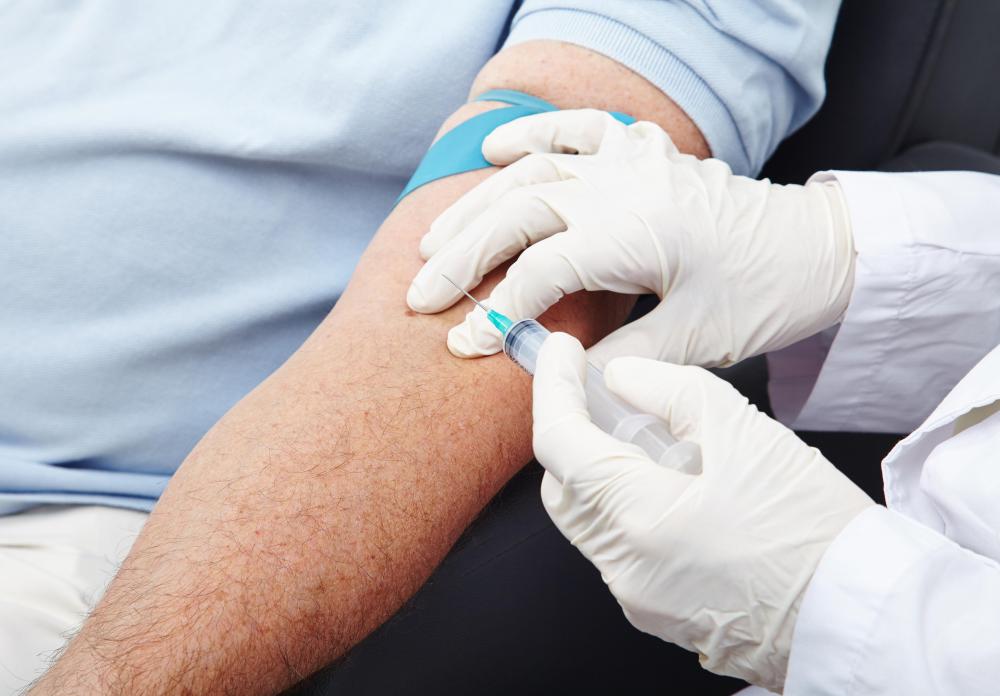At WiseGEEK, we're committed to delivering accurate, trustworthy information. Our expert-authored content is rigorously fact-checked and sourced from credible authorities. Discover how we uphold the highest standards in providing you with reliable knowledge.
How do I Choose the Best Treatment for Malaria?
Malaria is a highly infectious disease caused by a parasite that is typically spread by mosquitoes. This disease is usually found in tropical and subtropical parts of the world. Antibiotics are the best treatment for malaria in most cases. The specific type of antibiotic that is used as a treatment for malaria is typically determined by the type of malaria strain that an individual is exposed to. In some cases, the parasites that cause malaria can develop a resistance to some forms of antibiotics, which can narrow the list of possible drugs that doctors use to fight these strains.
Most patients with malaria require prompt hospitalization, where they often receive prompt treatment with an antibiotic or a combination of antibiotics. A commonly prescribed antibiotic drug that is used as a treatment for malaria is chloroquine. Patients with malaria strains that are resistant to chloroquine may receive other drugs such as sulfadoxine and pyrimethamine. Other antibiotics that may be prescribed as a treatment for malaria include tetracycline, quinidine, and proguanil. In some instances, patients may need intravenous fluids or respiratory support while they have a malaria infection.

Patients with malaria may experience fever, headaches, and chills from the disease. Other symptoms of this sickness can include nausea, vomiting, and sweating. In some cases, patients may have convulsions, they may go into a coma, or they may develop a liver condition called jaundice. Anemia, bloody stools, and muscle pain can also develop in some malaria patients.

Physicians often use blood tests as well as a physical examination to diagnose a malaria infection and help them determine an appropriate treatment for malaria. Most patients recover from malaria with antibiotic treatment, but some strains, such as Falciparum malaria, may be fatal in some instances. In some cases, patients with malaria have developed complications such as meningitis, kidney failure, and liver failure. Internal bleeding from a ruptured spleen and respiratory failure from fluid in the lungs have been reported in some malaria patients.

Individuals who plan to travel to some tropical or subtropical locations can generally benefit from taking some practical measures to prevent a malaria infection. As mosquitoes are the primary means of transmission of this disease, many people make an effort to avoid contact with mosquitoes while they are in areas where malaria is common. Protective clothing, bed nets, and insect repelling sprays may help people avoid mosquitoes. Individuals who spend time outdoors may benefit from applying an insect repellent to their skin. A doctor may prescribe an antimalarial medication for a patient to take prior to traveling to a tropical or subtropical part of the world.
AS FEATURED ON:
AS FEATURED ON:














Discussion Comments
@fBoyle-- I don't think there is any "best" medication for the treatment of malaria. They all have side effects and resistance is a possibility with all of them.
Having said that, some are better than others. I personally had a negative experience with mefloquine. It caused some weird psychotic side effects in me and in others in my travel group. We had weird dreams and a few of us suffered from hallucinations. I do not recommend this drug to anyone.
@fBoyle-- I'm sure that your doctor will prescribe you the right medication. Plus, you will have to get some preventive vaccinations for other diseases before you go. So let your doctor decide.
There are quite a few treatment options to prevent malaria and to treat malaria symptoms. But they all have their advantages and disadvantages. Quinine and Malarone are effective drugs, for example, but they are usually used for a shorter duration (one to two weeks).
You will probably have to take something like doxycycline which is not only affordable, but it's an antibiotic that you can take for a longer period of time if you need to. But you do have to be careful about sun exposure while on it.
I'm going on a trip to Africa. I'm not sure how long I will be there for but it will probably be months.
What is the best treatment for malaria in Africa? Is there a medication that can be taken for months without severe side effects?
Post your comments